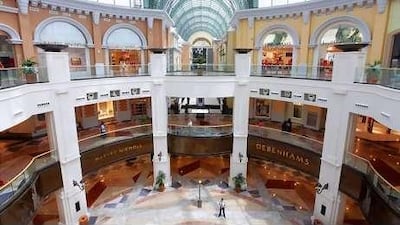From a rise in US unemployment claims to a fall in industrial production in the euro zone and a deceleration in Japanese growth, signs of the global economic recovery losing traction are everywhere to be seen.
Although the prospect of lurching into a double-dip recession appears less likely at the moment, most economists expect the outlook to cool in the second half of the year. High unemployment, weak consumer demand and a shortage of credit will act as a hangover from the financial crisis, dragging on growth. The momentum of recovery is expected to stall as advanced countries wean their economies off the stimulus measures that acted as a cushion during the hard times.
"We do see global risks increasing in the second half of the year," said Monica Malik, the chief economist at EFG-Hermes in Dubai. "We are moving from the first stage 'easy' recovery into a patchy growth outlook with far greater volatility." For the Gulf, the risks of a slowdown in the global economy are considerable. A drop in investment appetite could impact on capital flows which have experienced a short-term recovery since the downturn.
"Given that the region's main non-oil sector offer was real estate, outside of investment in the oil and gas sector, mainly in Saudi Arabia and Qatar, the rest of the region will have lower foreign direct investment (FDI) than anticipated at the start of this year," said John Sfakianakis, the chief economist at Banque Saudi Fransi. A combination of a slowdown in the region's property market and concerns about corporate restructuring could further deter foreign capital, say economists.
During the past decade, such flows have formed an important part of the region's economic transformation. FDI is important as it allows GCC governments to use more of their wealth from oil to build foreign currency reserves rather than finance domestic projects. It also enables the region to boost its diversification efforts through the transfer of expertise. FDI projects in Saudi Arabia create 375,000 jobs, 27 per cent of them for nationals, and generate salaries of US$7.8 billion (Dh28.64bn), according to research by NCB Capital. The kingdom has a total FDI stock of $147.1bn, followed by $73.4bn for the UAE. Kuwait attracts the least FDI in the region, with a stock of $986 million.
As a leading supplier of the world's oil and petrochemicals, the risk for the region from a slowdown is that it may choke demand for its main exports. With governments in Europe embarking on austerity programmes to cut budget deficits, and households in many large economies holding back on spending, the outlook for a global rebound that has spurred exports may become less certain. EFG-Hermes lowered its expectation for the price of oil to $75 for the second half of the year, slightly below its forecast of $77 for the year as a whole.
"Lower potential growth worldwide will impact on oil prices and this region should expect reduced oil revenues with more diversified parts like Saudi Arabia and the UAE suffering less than places like Kuwait," said Alessandro Magnoli Bocchi, the chief economist at Kuwait China Investment Company (KCIC). However, even if prices slipped to $60, they would still be almost double what they were at the trough of the recession, and sufficient to allow all states, except Bahrain, to continue their investment spending comfortably without falling into deficit. Prices have so far averaged $77 this year, compared with an average of $61 last year.
Another reason to be optimistic is that the GCC's fiscal health is in better condition than in European countries, which are being forced to cut back their expenditure in an attempt to gain control of bulging budget deficits. Other risks to the region's economic recovery are domestic-based. Persistently sluggish credit growth is proving a challenge in countries across the world as borrowers and lenders' appetite for credit remains low.
In the GCC, attempts to develop the role of the non-oil private sector hinge on the ability of businesses to access bank credit. After an abundant flow of finance contributed to an average credit growth of 30 per cent in 2007-08, the IMF forecasts credit expansion in the region to be in the low single digits this year. Banque Saudi Fransi expects private-sector credit growth in the region's biggest economy, Saudi Arabia, to be about 5 to 8 per cent this year, better than last year but far short of the pre-global recession era. "In an environment where the global economy is jittery, appetite for expansion and credit in the private sector will be affected," said Mr Sfakianakis.
"This may mean the postponement of projects will be more prevalent than before the crisis." tarnold@thenational.ae

